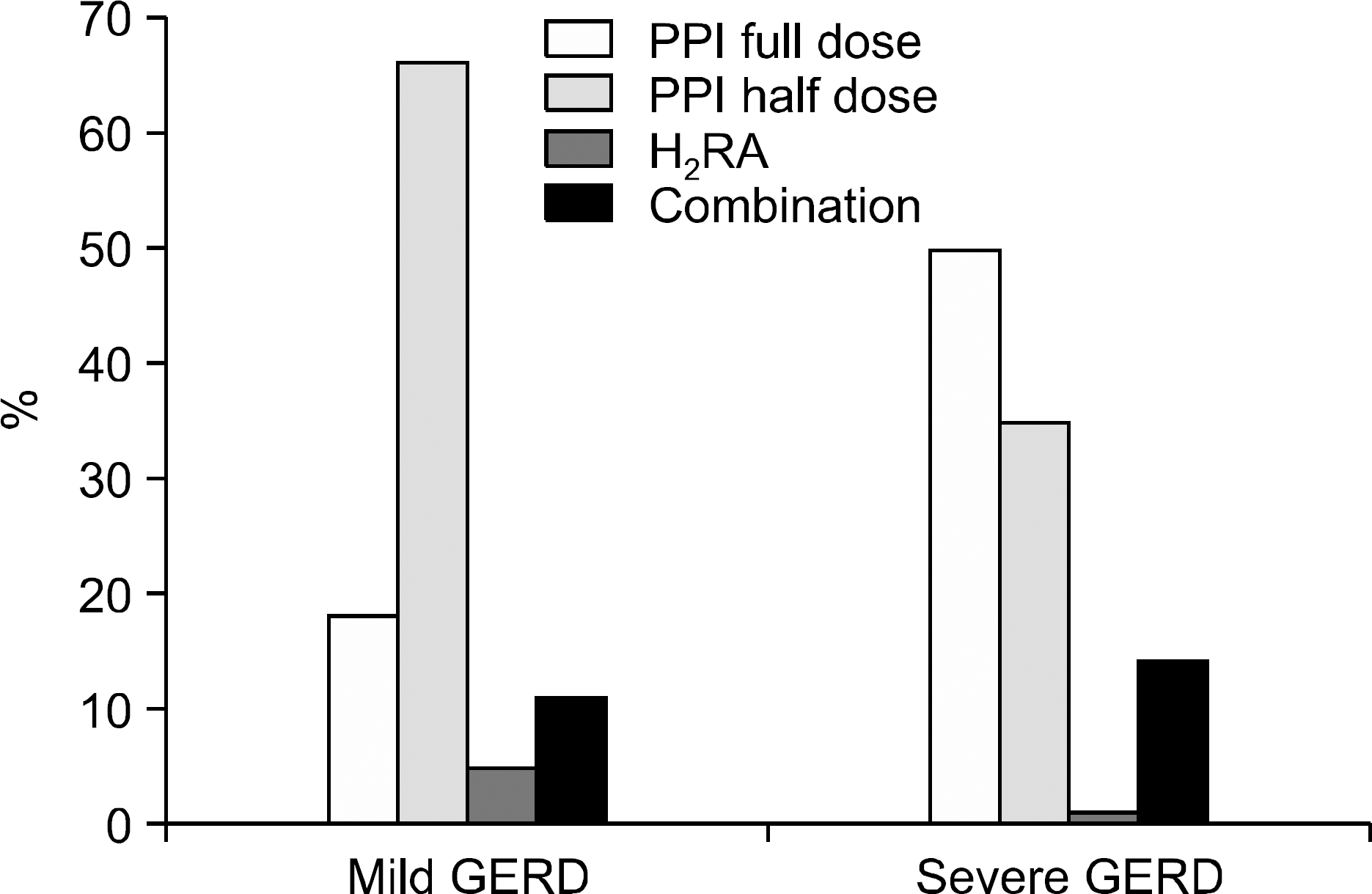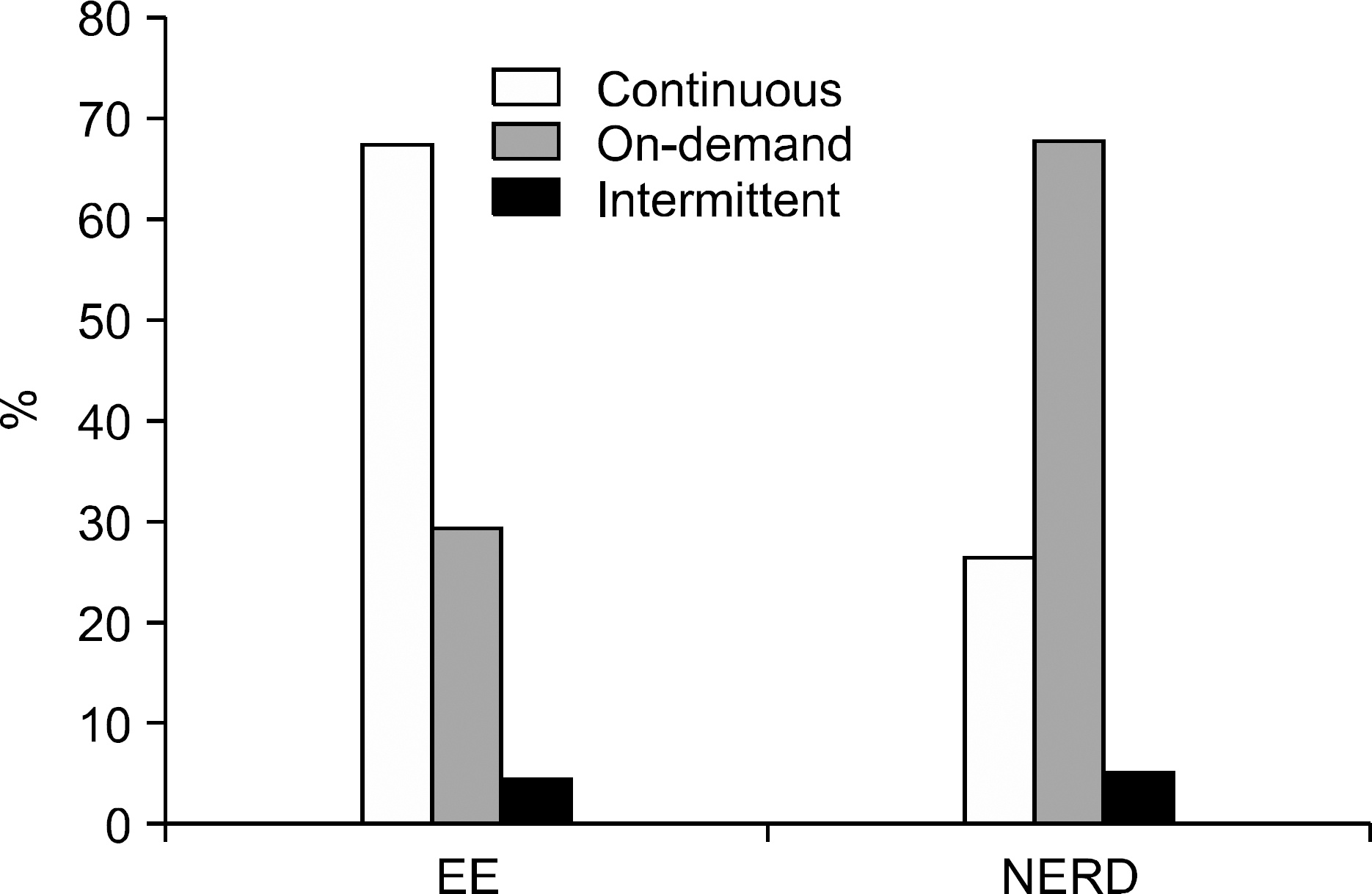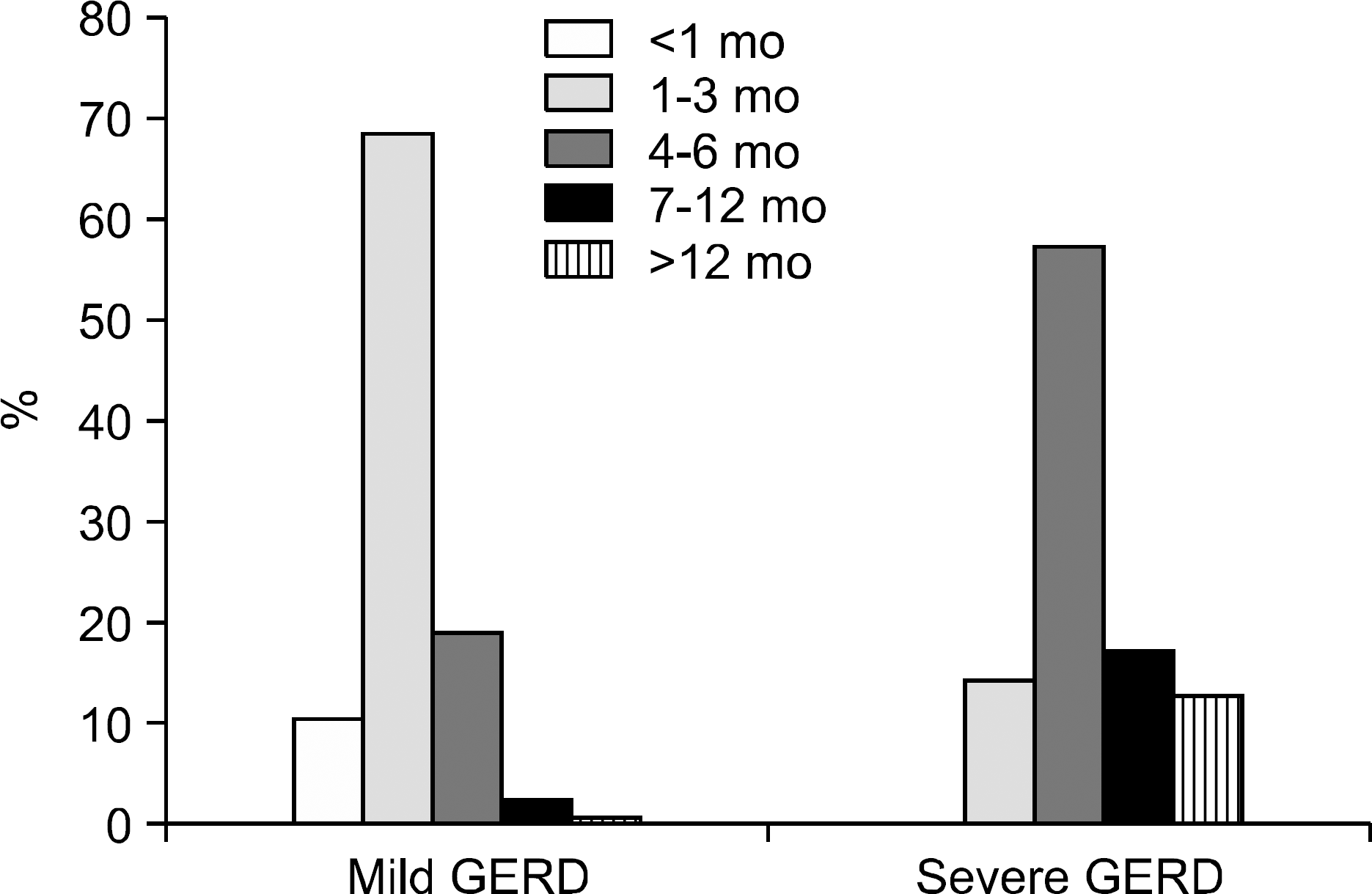Abstract
Background/Aims
Gastroesophageal reflux disease (GERD) is a chronic condition and accompanied by frequent relapses. We aimed to evaluate the clinical practice patterns of gastroenterologists for initial and maintenance therapy of GERD in Korea.
Methods
We administered a nationwide, multicenter, and questionnaire-based online survey between December 2007 and January 2008. The questionnaire consisted of 15 questions about prescribing patterns of initial and maintenance therapy for GERD.
Results
A total of 371 gastroenterologists participated in the survey with the response rate of 77%. For mild cases of GERD, the most common choice of initial therapy was full dose proton-pump inhibitors (PPIs) (59%), followed by half dose PPIs (20%), and H2 receptor antagonists (4%). For severe cases, full dose PPIs were prescribed in 99%. Almost all gastroenterologists agreed to the need for maintenance therapy. For both mild (95%) and severe (99%) cases of GERD, gastroenterologists preferred the use of PPI-based maintenance regimen. The preferred maintenance strategy for GERD was continuous therapy in erosive esophagitis (67%), and on-demand therapy in non-erosive reflux disease (68%). The overall duration of the therapy (initial+maintenance) was 7.7±5.1 wk in mild cases and 15.0±9.4 wk in severe cases. The duration of maintenance therapy was affected by symptom severity, followed by symptom frequency and endoscopic finding.
Go to : 
REFERENCES
1. Dent J, Brun J, Fendrick AM, et al. An evidence-based appraisal of reflux disease management: the Genval Workshop Report. Gut. 1999; 44:S1–S16.
2. Cho YS, Choi MG, Jeong JJ, et al. Prevalence and clinical spectrum of gastroesophageal reflux: a population-based study in Asan-si, Korea. Am J Gastroenterol. 2005; 100:747–753.

3. Kim N, Lee SW, Cho SI, et al. H. pylori and Gerd Study Group of Korean College of Helicobacter and Upper Gastrointestinal Research. The prevalence of and risk factors for erosive oesophagitis and non-erosive reflux disease: a nationwide multicentre prospective study in Korea. Aliment Pharmacol Ther. 2008; 27:173–185.
4. Havelund T, Lind T, Wiklund I, et al. Quality of life in patients with heartburn but without esophagitis: effects of treatment with omeprazole. Am J Gastroenterol. 1999; 94:1782–1789.

5. Hetzel DJ, Dent J, Reed WD, et al. Healing and relapse of severe peptic esophagitis after treatment with omeprazole. Gastroenterology. 1988; 95:903–912.

6. Moayyedi P, Talley N. Gastroesophageal reflux disease. Lancet. 2006; 367:2086–2100.
7. Tytgat GN. Review article: management of mild and severe gastro-oesophageal reflux disease. Aliment Pharmacol Ther. 2003; 17:52–56.
8. Donnellan C, Sharma N, Preston C, Moayyedi P. Medical treatments for the maintenance therapy of reflux oesophagitis and endoscopic negative reflux disease. Cochrane Database Syst Rev. 2004; 4:CD003245.

9. DeVault KR, Castell DO; American College of Gastroenterology. Updated guidelines for the diagnosis and treatment of gastroesophageal reflux disease. Am J Gastroenterol. 2005; 100:190–200.
10. Fock KM, Talley NJ, Fass R, et al. Asia-Pacific consensus on the management of gastroesophageal reflux disease: update. J Gastroenterol Hepatol. 2008; 23:8–22.

11. Wong WM, Lim P, Wong BC. Clinical practice pattern of gastroenterologists, primary care physicians, and otolaryngologists for the management of GERD in the Asia-Pacific region: the FAST survey. J Gastroenterol Hepatol. 2004; 19:S54–S60.

12. Bytzer P. Assessment of reflux symptom severity: methodological options and their attributes. Gut. 2004; 53:28–34.

13. Hallerback B, Unge P, Carling L, et al. Omeprazole or ranitidine in longterm treatment of reflux esophagitis. The Scandinavian Clinics for United Research Group. Gastroenterology. 1994; 107:1305–1311.
14. Festen HP, Schenk E, Tan G, Snel P, Nelis F. Omeprazole versus high-dose ranitidine in mild gastroesophageal reflux disease: short- and longterm treatment. The Dutch Reflux Study Group. Am J Gastroenterol. 1999; 94:931–936.
15. Farley A, Wruble LD, Humphries TJ. Rabeprazole versus ranitidine for the treatment of erosive gastroesophageal reflux disease: a double-blind, randomized clinical trial. Rabeprazole Study Group. Am J Gastroenterol. 2000; 95:1894–1899.
16. Dent J, Yeomans ND, Mackinnon M, et al. Omeprazole vs ranitidine for prevention of relapse in reflux oesophagitis. A controlled double blind trial of their efficacy and safety. Gut. 1994; 35:590–598.
17. Harris RA, Kuppermann M, Richter JE. Proton pump inhibitors or histamine-2 receptor antagonists for the prevention of recurrences of erosive reflux esophagitis: a cost-effectiveness analysis. Am J Gastroenterol. 1997; 92:2179–2187.
18. Harris RA, Kuppermann M, Richter JE. Prevention of recurrences of erosive reflux esophagitis: a cost-effectiveness analysis of maintenance proton pump inhibition. Am J Med. 1997; 102:78–88.

19. Birbara C, Breiter J, Perdomo C, Hahne W. Rabeprazole for the prevention of recurrent erosive or ulcerative gastro-oesophageal reflux disease. Rabeprazole Study Group. Eur J Gastroenterol Hepatol. 2000; 12:889–897.
20. Yun HR, Jung HY, Park HJ, Bae SC. Cost-effectiveness analysis of proton pump inhibitors and ranitidine in the treatment of gastroesophageal disease. Korean J Med. 2002; 62:504–512.
21. Korean Medical Association. Guideline for using gastrointestinal drugs. Reston: Korean Medical Association;2003.
22. Talley NJ, Venables TL, Green JR, et al. Esomeprazole 40 mg and 20 mg is efficacious in the longterm management of patients with endoscopy-negative gastro-oesophageal reflux disease: a placebo-controlled trial of on-demand therapy for 6 months. Eur J Gastroenterol Hepatol. 2002; 14:857–863.

23. Kim JW, Kim HS, Lee DK, et al. Therapeutic effect of low-dose omeprazole vs. standard-dose ranitidine in mild to moderate reflux esophagitis. Korean J Gastroenterol. 2004; 43:153–159.
24. Vigneri S, Termini R, Leandro G, et al. A comparison of five maintenance therapies for reflux esophagitis. N Engl J Med. 1995; 333:1106–1110.

25. Bardhan KD. Intermittent and on-demand use of proton pump inhibitors in the management of symptomatic gastroesophageal reflux disease. Am J Gastroenterol. 2003; 98:S40–S48.

26. Zacny J, Zamakhshary M, Sketris I, Veldhuyzen van Zanten S. Systematic review: the efficacy of intermittent and on-demand therapy with histamine H2-receptor antagonists or proton pump inhibitors for gastro-oesophageal reflus disease patients. Aliment Pharmacol Ther. 2005; 21:1299–1312.
27. Gerson LB, Robbins AS, Garber A, Hornberger J, Triadafilo-poulos G. A cost-effectiveness analysis of prescribing strategies in the management of gastroesophageal reflux disease. Am J Gastroenterol. 2000; 95:395–407.

28. Talley NJ, Lauritsen K, Tunturi-Hihnala H, et al. Esomeprazole 20 mg maintains symptom control in endoscopy-negative gastro-oesophageal reflux disease: a controlled trial of ‘on-demand’ therapy for 6 months. Aliment Pharmacol Ther. 2001; 15:347–354.
29. Vakil N. Review article: cost-effectiveness of different GERD management strategies. Aliment Pharmacol Ther. 2002; 16:79–82.
30. Bytzer P, Blum A, DE Herdt D, Dubois D. The Trial Investigators. Six-month trial of on-demand rabeprazole 10 mg maintains symptom relief in patients with non-erosive reflux disease. Aliment Pharmacol Ther. 2004; 20:181–188.
Go to : 
 | Fig. 1.Medication of choice for maintenance therapy in mild and severe gastroesophageal reflux disease. GERD, gastroesophageal reflux disease; PPI, proton pump inhibitor; H2RA, H2 receptor antagonist. |
 | Fig. 2.Maintenance strategy of choice for mild and severe gastroesophageal reflux disease. EE, erosive esophagitis; NERD, non-erosive reflux disease. |
 | Fig. 3.Total duration of treatment for mild and severe gastroesophageal reflux disease. GERD, gastroesophageal reflux disease. |
Table 1.
Demographic Information of 371 Respondent Gastroenterologists
| No. | % | |
|---|---|---|
| Mean age, year (range) | 42.4±4.8 | (32-68) |
| Sex (male:female) | 6:1 | 1 |
| Location of the hospitals | ||
| Seoul | 82 | 22 |
| Metropolitan city∗ | 79 | 21 |
| Gyeonggi province | 57 | 15 |
| Chungcheong province | 52 | 14 |
| Gyeongsang province | 75 | 20 |
| Jeolla province | 24 | 7 |
| Jeju province | 2 | 1 |
| Length of practice (year) | ||
| 1-4 | 95 | 26 |
| 5-9 | 164 | 44 |
| 10-14 | 67 | 18 |
| ≥15 | 45 | 12 |
| Affiliation | ||
| University or general hospital | 232 | 63 |
| Smaller hospital | 139 | 38 |
Table 2.
Proportions of Several Factors Influencing the Duration of Treatment in Gastroesophageal Reflux Disease∗
| 1st | 2nd | 3rd | 1st-3rd | |
|---|---|---|---|---|
| (%) | (%) | (%) | (%)† | |
| Symptom severity | 72.9 | 17.6 | 6.2 | 32.3 |
| Symptom frequency | 5.9 | 40.0 | 17.9 | 21.3 |
| Presence or absence of lesion | 5.0 | 7.9 | 12.9 | 8.6 |
| Severity of lesion | 11.8 | 25.3 | 26.5 | 21.2 |
| Patient's economy | 0 | 1.8 | 9.1 | 3.6 |
| Patient's residence | 0 | 0.3 | 2.4 | 0.9 |
| Insurance policy of the government | 0 | 4.4 | 17.1 | 7.2 |
| Insurance policy of the hospital | 2.9 | 1.8 | 2.9 | 2.5 |
| Prescription pattern of doctor | 0.6 | 0.6 | 3.8 | 1.7 |
| Clinical condition of doctor | 0.9 | 0.3 | 1.2 | 0.8 |
| Total | 100 | 100 | 100 | 100 |
5. 초 치료에 주로 사용하는 방법은 무엇입니까?
| 경증 위식도 역류질환 | 중증 위식도 역류질환 | |
|---|---|---|
| 1) Full-dose PPI | ||
| 2) Half-dose PPI | ||
| 3) H2RA | ||
| 4) Prokinetics | ||
| 5) Antacid | ||
| 6) Life modification | ||
| 7) Combination |
6. 초 치료 기간은 어느 정도인지 환자의 비율을 적어 주 십시오.
| 경증 위식도 역류질환 중 | 증 위식도 역류질환 | |
|---|---|---|
| 1) 4주 이내 | % | % |
| 2) 4-8주 | % | % |
| 3) 8주 이상 | % | % |
7. 위식도 역류질환의 유지치료에 주로 사용하는 투여법은 무엇입니까?
| 경증 위식도 역류질환 | 중증 위식도 역류질환 | |
|---|---|---|
| 1) Continuous therapy | ||
| 2) On-demand therapy | ||
| 3) Intermittent therapy | ||
| 4) 기타 |




 PDF
PDF ePub
ePub Citation
Citation Print
Print


 XML Download
XML Download